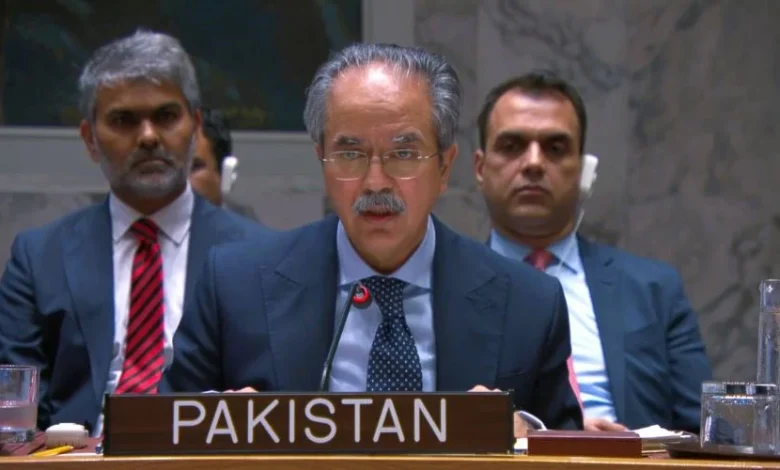Pakistan calls for Taliban action and alerts the UN to Afghanistan’s terror threat.

Pakistan has urged Taliban leaders across the border to fulfill their international counterterrorism duties, telling the UN Security Council that terrorism coming from Afghanistan continues to be the “gravest threat” to national security.
During a discussion on the situation in Afghanistan, Pakistan’s permanent representative to the UN, Ambassador Asim Iftikhar Ahmad, said, “With almost 6,000 fighters, the TTP (Tehreek-e-Taliban Pakistan) remains the largest UN-designated terrorist group on Afghan soil.”
He asserted that Pakistan had thwarted several attempts by TTP and BLA (Balochistan Liberation Army) terrorists from all over Afghanistan to infiltrate the country and had taken control of sizable caches of advanced military-grade modern equipment that had been left behind by foreign forces in Afghanistan, mostly weapons left by US soldiers who were leaving the country.
“These efforts come at a heavy price – huge sacrifices by our valiant security forces and civilians,” Ambassador Asim added, alluding to the 12 Pakistani soldiers who lost their lives defending the border earlier this month.
The 15-member council was informed by the Pakistani envoy that “this situation is intolerable.”
He asserted that more than 60 terrorist camps in Afghanistan act as headquarters for cross-border infiltration and attacks by terrorist organizations like ISIL-K, Al-Qaeda, TTP, BLA, and its Majeed Brigade.
“We have credible evidence of collaboration among these terrorist groups through joint training, illicit weapons trade, refuge to terrorists, and coordinated attacks – all aimed at targeting civilian and law enforcement agencies and disrupting and sabotaging infrastructure and development projects in Pakistan.”
He called for prompt action in response to China and Pakistan’s demand to designate the BLA and Majeed Brigade as terrorist organizations in the UN Security Council’s 1267 Sanctions Committee. The two terrorist groups have previously been classified by the US.
Ambassador Iftikhar emphasized that the Taliban sanctions system should not “fall prey to political considerations of Council members,” citing Pakistan’s “consistent advocacy for sustained engagement with Afghanistan.”
Citing a recent quadrilateral conference involving Pakistan, China, Iran, and the Russian Federation in Dushanbe, “where we agreed on result-oriented engagement” with Afghanistan’s interim government, he stated that requests for travel-ban exemptions in particular are still essential for meaningful engagement.
He called for international cooperation with specific goals, reciprocal actions, and a “realistic road map guided by dialogue and diplomacy,” stressing that disengagement and isolation are not beneficial to anyone.
He added: “Continued restrictions on (Afghan) women and girls are inconsistent with Islamic traditions and norms of Muslim society.”
“Many Afghans who had been hosted by Pakistan for decades have been repatriated in a dignified, phased, and orderly manner with the end of the conflict in Afghanistan,” the Pakistani envoy said.
A generous visa policy has also been put in place by Pakistan, enabling many Afghans to live there lawfully for a range of purposes, such as business, education, family relations, and medical treatment.
“While we will continue to extend all possible assistance to our Afghan brothers and sisters, the international community must shoulder its responsibility and take the necessary steps to ameliorate the conditions and share this burden more equitably,” he stated. “International partners must fulfill their obligations also with regard to their commitments – that are in fact long delayed and unkept – including for third country resettlements.”
The ambassador said that Pakistan wants peace and stability in Afghanistan more than any other nation.
“The decades-long battle in Afghanistan has caused the greatest suffering for Pakistan. For the sake of our area and the global community, we are still dedicated to assisting an Afghanistan that is peaceful and prosperous.
The UN’s departing ambassador began by cautioning that Afghanistan is dealing with “a perfect storm” of interrelated issues.
The Council was informed by Roza Otunbayeva, the secretary-general’s special representative for Afghanistan, that although there has been less violent fighting in the nation since the Taliban came to power in 2021, the humanitarian, economic, and human rights conditions have significantly worsened.
“It is an open question whether there is sufficient pragmatism among the de facto authorities [the Taliban] to manage this perfect storm of crises, or whether decisions driven by ideology will prevent sustainable solutions,” she stated to the crowd.
Otunbayeva underlined that the crisis stems from the Taliban’s extensive restrictions on Afghan women and girls.
The World Bank estimates that the economy has lost $1.4 billion annually as a result of the closure of girls’ schools above the sixth grade for the past four years. Most Afghans are against the bans, according to a recent UN Women survey.
“This is most clear regarding the de facto authorities’ policies towards Afghan women,” she stated. “A generation is at serious risk of being lost at a huge long-term cost to the country.”